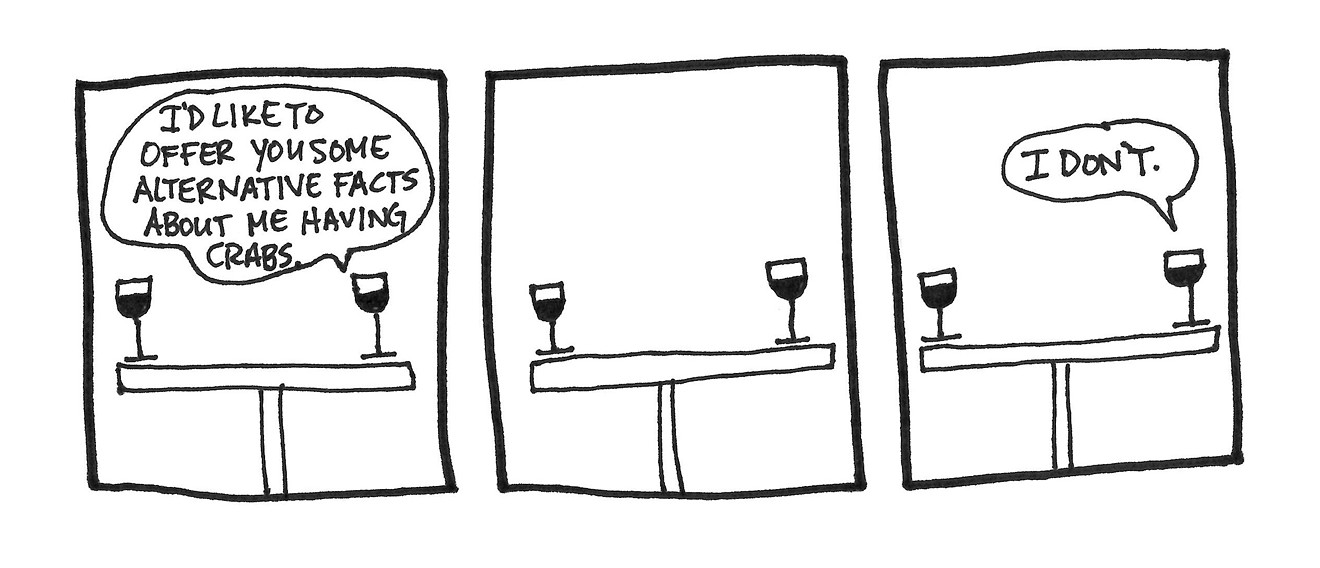Westword: What was the impetus for creating a collection of your dreams for your new book, Want to Hear About This Dream I Had?
Sommer Browning: I was talking with Adam Tedesco, who runs and publishes the magazine and press Reality Beach out of Albany, New York. He's into esoterica, I guess, and cosmic happenings and mystery. We were talking about dreams. I've been having a lot of vivid dreams lately, and he said, "I would totally read a book of your dreams." He had read some of my other books and work.
I was like, really? You would read a book of my dreams? Everyone thinks dreams are boring, you know?
It was kind of an internal battle. It felt really conceited or something [laughs]. But I started waking up in the middle of the night or whenever my dreams would finish and write them down. Basically, the book is verbatim my dreams.
Usually, when someone wants to tell me about their dreams, I'm like, "Oh God, please don't." Your collection, however, worked well in part because of the conciseness and form of the work.
I'm usually a poet, so I used those techniques and that way of pulling out the details that matter. I was very cognizant of that when I was transcribing them and writing them.
WANT TO HEAR ABOUT THIS DREAM I HAD from REALITY BEACH on Vimeo.
Was there anything that appeared in your dreams that you were surprised by?A couple of things: When you go to bed thinking, "I'm going to write down my dream," you remember your dream more. When you do that for a period of weeks, you really end up remembering them more. Also, I noticed that my drug intake the day before would very much effect the recollection of my dreams or even if I dreamed at all. I have one piece in the book that is a list of drugs that make me not remember my dreams — everything from mushrooms to Benadryl to wine and alcohol to Xanax.
When I finished and looked at the whole book as a work, I am immediately thrown into the things that happened in reality during that time. I was divorcing, I was living with a four-year-old on my own, doing a lot of Tinder dating and having a lot of male, masculine people in and out of my life intensely. I can see the remnants of that in those dreams and can trace it back to the real events and things that were happening during that time — like a weird, inverse diary, but through a subconscious veil.

Sommer Browning's new book, Want to Hear About This Dream I Had, published by Reality Beach.
Courtesy of the author
It's really quite different from writing. It's a lot more fun and free and spontaneous. I get ideas throughout the day; I can't just sit down with a blank page and start drawing. I look through my notebook and work from what I've created, like, "Oh, yeah! I forgot about this banana wearing a blindfold being tied down and tortured." [Laughs.] Maybe it's not spontaneous as much as it is inspired by some weird thought.
You're great on Twitter, which, like any social-media platform, has its nuances and a certain way that it "works." As a writer, I see the 140-character limit as one of the best parts of Twitter.
Yes! It's like an exercise in brevity. I love the constraint of it and trying to choose the most evocative words. I love thinking about punctuation so much. It's a little bit like training for poems. I certainly try to be funny and weird and odd there as much as I can be — which has been less, because I've been so angry all the time. I also think that when I read tweets, I read them as dialogue. I read them thinking someone is saying it. I certainly don't do that for an essay. It can be like transcription in that way. I have a couple of joke books I've written, too, so I use Twitter to test out the jokes.
You're a librarian by day, a job that I've always viewed as a valuable public service. However, along with scientists, National Park Service workers and a host of other professions, librarians face threats of funding cuts from some Republicans. I see many of my librarian friends standing up publicly and on social media for the first time. How do you feel about being a librarian in this time?
That's a good question. I feel very activated by my position here and the fundamentals of librarianship and our basic tenants of free knowledge, access to everyone, all people are welcome, no surveilling of people's research, privacy issues — those kinds of things. I think about them constantly now. In my day-to-day work, I think about things like, what exhibits do we have right now in the special-collections cases? Or I think about things like, can I criticize the American Library Association president and the messages she sends out?
Also, we work in an on-purpose non-capitalist structure that's trying to thrive in this maniacal, cannibalistic country. We don't even collect fines anymore; there's no money going on here, except for us always trying to come in under budget. Yes, homeless people come into the library, and, yes, they can charge their phone in here. And that kind of activity is always under attack.
We also bridge the digital divide, which is a big, important point for libraries, especially public libraries. So many folks don't have Internet. We take Internet access for granted. Who are the people affected by that? Poor people. America hates poor people, almost more than people of color.
Find Sommer Browning's new book, Want to Hear About This Dream I Had, and her latest collection of comics, Everything but Sex, via the author's website. Find Browning on Twitter under the handle @vagtalk.













